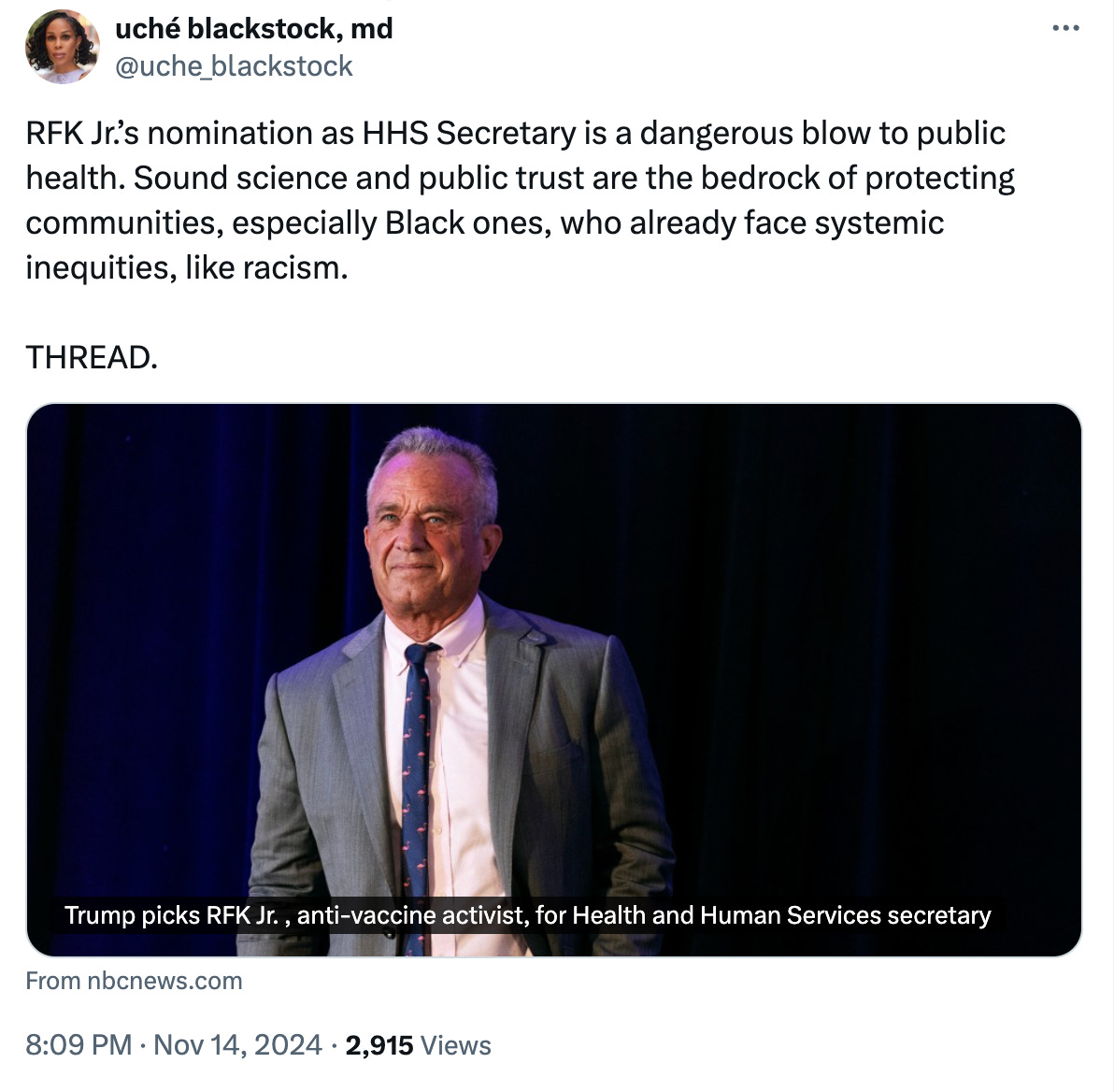Onward.
Trying to make sense out of this shit.
I’m worried that spooky times await us regarding health and well-being, particularly for Black folks. As readers of this newsletter know, Black Americans are disproportionately adversely affected in a multitude of health and well-being categories. Experts anticipate that the second Trump Administration will harm public health based on policies and priorities from his previous term and recent campaign statements. Below, I’m sharing an unorganized round-up of thoughts—including some from others—because, hell, I’m still processing.
Al-Jazeera: Trump to worsen our plight: Palestinian, Lebanese victims of Israel’s wars
Deir el-Balah, Gaza, Palestine, and Beirut, Lebanon – Palestinian and Lebanese civilians are bracing for more devastation once Donald Trump begins his second term as president of the United States in January.
While millions of Trump supporters celebrate his victory, many in the Middle East are looking on with trepidation.
In Gaza, the occupied West Bank, and Lebanon, there are fears the loyal ally of Israel will embolden its prime minister, Benjamin Netanyahu, and far-right coalition government to escalate regional conflicts and destroy any possibility of Palestinian self-determination.
“I have no trust in America,” said Abu Ali, an 87-year-old in Gaza who has been uprooted from his home like most people there. “I’m expecting the war in Gaza to get even worse [under Trump].”
US President Joe Biden’s outgoing administration has supported Israel in its campaign in Gaza.
Since the Hamas-led attacks on southern Israel on October 7, 2023, during which 1,139 people were killed and 250 taken captive, Israel’s genocide against Palestinians in Gaza – using US weapons – has killed more than 43,000 Palestinians and uprooted almost the entire population of 2.3 million people.
On Maternal Health Going Forward
While Trump hasn’t said that he’ll implement a nationwide ban on abortion or gut family-supportive policies, history and a Republican trifecta—meaning the GOP will gain control of the White House and both chambers of Congress on January 20—give me an immense pause, particularly concerning maternal health.
The abortion bans that followed the Supreme Court’s 2022 decision to overturn Roe v. Wade limit access to safe abortions, which disproportionately affects Black women, a demographic that already experiences higher rates of pregnancy-related complications and maternal mortality. (Currently, almost 55 percent of all Black women of reproductive age in the United States live in states that have banned or are likely to ban abortion. These states also have above-average maternal mortality rates.) A possible effort to limit mail-order abortion medications, which greatly expands abortion access and possible reinstatement of the “gag rule” heightens my concern. Abortion bans also make existing health care disparities worse, meaning birthing persons are left with fewer options and an increased risk of poor maternal health outcomes.
However, other family-supportive policies can affect maternal health, too. Limited access to paid family and medical leave increases the risk of maternal mortality. Should the Trump administration decide to rewrite recent regulations expanding access to Medicaid, it’s possible that maternal mortality rates could be negatively affected. Medicaid covers nearly 40 percent of births in the United States, with this rate rising to 65 percent among Black birthing people. Expanding coverage improves access to prenatal care, mental health services, and preventive screenings for birthing persons and their children. Still, there is hope going forward.
Voters in seven states protected abortion rights, and in three others, they created new rights to paid sick time, which guarantees at least a handful of paid days for health and care purposes. Birth funds targeting low-income parents and Black parents still exist. Doulas and midwives dedicated to improving maternal health outcomes still exist. In fact, they’ve always been a watchful third party advocating for the pregnant person’s autonomy and well-being before, during, and after birth.
The fight to ensure that every birthing person who chooses to have children can do so safely will continue—regardless of who’s in office.
Sigh, Then There’s This Guy
The Wellness to White Supremacy Pipeline has been Working Harder than the Devil For Real
Expanded missives from an IG story I posted the other day in response to a post about wellness Instagram accounts that steer followers toward extremist views.
There's a really good article in The Atlantic called The Crunchy-to-Alt-Right Pipeline. But essentially, what we're seeing happening—and what has happened for quite some time—with wellness culture is that this idea of purity seeps into people's minds. And purity is white supremacist language. So, get a group of people who are heavily distrustful of institutions like the FDA, the CDC, the NIH, or modern Western medicine. That distrust can make them susceptible to alt-right ideologies. White supremacist movements are often intertwined with anti-government sentiment; it’s a way to hook people.
We also saw this during the first two years of the COVID-19 pandemic. A group of people believed that they were physiologically superior because they were healthy—meaning they had ideal diets, worked out, and were physically fit. Many of them posted online about how they didn’t eat like trash and they weren’t fat, which they believed would protect them from an adverse outcome should they get COVID-19. Being “fit and healthy” also became a war cry against vaccination. While it is true that being in good shape can help prevent COVID-related hospitalizations, it’s not a panacea for beating any illness, and it certainly doesn’t replace getting vaccinated. Another very prominent instance of it was the Republican congresswoman who posted her workout routine and said it was her protection against COVID.
Wellness is a microcosm of many of the issues we see play out at a societal level. I think one reason why it is a very pervasive way to red pill people is because we typically experience health as individuals. Yes, we should be looking at health through a communal lens. However, most people do not. When most people think about their health, they think about themselves, their body, mind, and soul. Health and well-being are so personal, and it's something that you feel every day—down to how you feel when you wake up in the morning and how your body moves through space; it is a very pervasive way to get into people's heads and, in some cases, determine their political views and how they vote.







I loved reading this missive as a companion piece to this one: https://jessicadefino.substack.com/p/2024-self-care-boom-trump